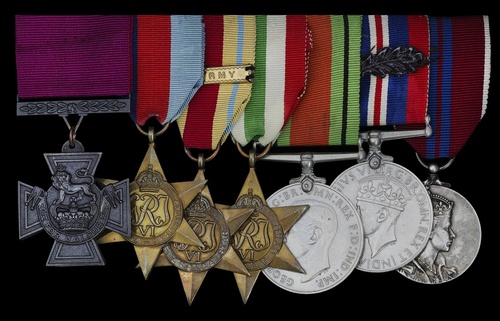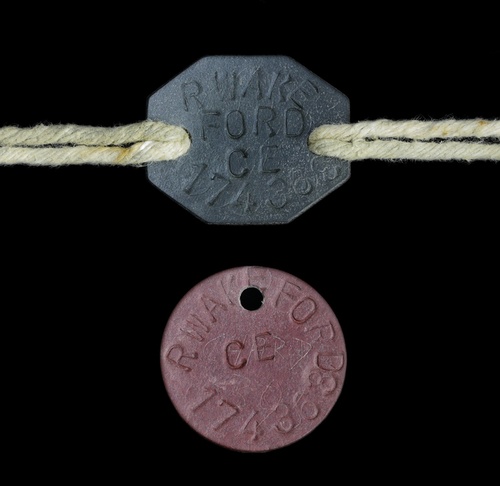Auction: 19001 - Orders, Decorations and Medals
Lot: 567
The important archive and replica V.C. group of seven worn by Major R. Wakeford, The Hampshire Regiment, who aged 22 and accompanied by his orderly and armed only with a revolver, advanced and killed a number of enemy from the German 1st Parachute Division, and 'bagged' over 20 prisoners when the Company came forward
Victoria Cross, a quality tailor's copy (Captain Richard Wakeford 2/4th Bn The Hampshire Regt 13th May 1944); 1939-45 Star; Africa Star, copy clasp, 1st Army; Italy Star; Defence and War Medals 1939-45, M.I.D. oak leaf; Coronation 1953, as worn, very fine (7)
V.C. London Gazette 11 July 1944;
'On 13th May, 1944, Captain Wakeford commanded the leading Company on the right flank of an attack on two hills near Cassino, and accompanied by his orderly and armed only with a revolver, he killed a number of the enemy and handed over 20 prisoners when the Company came forward.
On the final objective a German officer and 5 other ranks were holding a house. After being twice driven back by grenades, Captain Wakeford, with a final dash, reached the window and hurled in his grenades. Those of the enemy who were not killed or wounded, surrendered.
Attacking another feature on the following day, a tank became bogged on the start line, surprise was lost and the leading infantry were caught in the enemy's fire, so that the resulting casualties endangered the whole operation. Captain Wakeford, keeping his Company under perfect control, crossed the start line and although wounded in the face and both arms, led his men up the hill. Half way up the hill his Company came under heavy Spandau fire; in spite of his wounds, he organised and led a force to deal with this opposition so that his Company could get on.
By now the Company was being heavily mortared and Captain Wakeford was again wounded, in both legs, but he still went on and reaching his objective, he organised and consolidated the remainder of his Company and reported to his Commanding Officer before submitting to any personal attention. During the seven hour interval before stretcher bearers could reach him his unwavering high spirits encouraged the wounded men around him. His selfless devotion to duty, leadership, determination, courage and disregard for his own serious injuries were beyond all praise.'
Richard "Gunner" Wakeford was born on 23 July 1921, the son of Victor David Collins Wakeford, a successful Medical Practitioner. He grew up at 728 Fulham Road and was educated at Westminster School, where he became Captain of Boats and Captain of Shooting. His talent in the latter accounted for his nickname; according to one of his subalterns in Italy, Captain G. A. Cutress, M.C., 'He was an astounding shot' with a .45 Colt automatic pistol:
'I saw him kill a running German at all of 80 yards.'
When war broke out, Wakeford was preparing to go up to Oxford University for October 1940, but volunteered for the Army instead. He served in North Africa - where he was wounded - and was very much the confident and battle-seasoned young officer by the time the 2/4th Battalion, The Hampshire Regiment, reached the foothills of Monte Cassino. On 13 May 1944, Wakeford commanded the leading Company on the right flank of an attack on two hills. Met by 'fierce fire', he and his batman, Private J. Baxter, determined to move ahead and start 'winkling out' the strongest points with grenades. Wakeford twice attempted to crawl near a house which was strongly held by a German Officer and a number of other ranks who endeavoured to liberally lob grenades at anyone who approached - he was forced back on both occasions. Incensed, he rose up and dashed to the house, tossing his own grenades through the window. Those of the enemy who were not killed forthwith surrendered and the Company pressed on.
The next day a second attack was launched, but things stalled when a tank became bogged down on the start line and the element of surprise was lost. Wakeford's Company was caught amongst withering enemy fire and casualties were heavy - yet he went ahead, yelling to the survivors to follow and 'blazing away with his pistol.' Wounded in the face and both arms, he kept going until a mortar bomb landed close to him and brought him down. Captain Cutress refers to this moment:
'Private Baxter crawled back to me and told me he was badly hit and in great pain, so I went forward to give him a shot of morphia. But when Wakeford saw me he yanked out his .45 and snarled: 'If you try to stick that thing in me I'll plug you!'
Despite his wounds, Wakeford heaved up to his feet and called his men to advance again, leading the way to the final objective.
Attention of a medical kind was a long time coming and the handful of men remaining from the original 80-strong Company were in an advanced, isolated position with no immediate support and with every expectation of a counter attack:
'But with 'Gunner' Wakeford on hand, there was no question of morale getting low. It was seven hours before we received support and stretcher bearers, and during all that time he kept everybody confident and feeling cheerful.'
Wakeford was awarded the V.C., whilst Private Baxter, who had crawled back to summon help, received a well-earned Military Medal. Of the V.C., Wakeford only made one remark when interviewed by a journalist some fifteen years later:
'At the time of the action, it never crossed my mind that I would get an award, and it was all a bit embarrassing. Of course, you know as I know that many men did things that never got recognition. It's important never to forget that.'
Wakeford returned home to recover from his wounds and, following the cessation of hostilities, came up to Trinity College, Oxford, in early 1946 to study law. He had always wanted to be a surgeon, but one of his wounds had affected his left hand and he determined to become a solicitor. He also stroked the Trinity rowing VIII's to success for two classic seasons.
On 31 March 1951, Wakeford married 'a pretty girl', Denise Elizabeth Corlson and the couple set up home in Leatherhead, Surrey. This was something of a surprise - a welcome one - to his many friends and family:
'It is difficult to realise that a man whose deeds sound like a fanfare of trumpets was at heart a diffident and sensitive person; but Wakeford was just that. It would be wrong to suggest that as a young man he was frightened of nothing: he was frightened of women. He would quite simply run away if his friends brought them near.'
Thankfully, the limited opportunities of seclusion offered by a ship enabled him to stand still long enough to 'notice the charm of Denise Corlson, and be wholly conquered by it.'
In 1964, Wakeford was appointed Master of the Chancery Division of the Supreme Court and later became a magistrate at Epsom and President of the Leatherhead branch of the Royal British Legion. He died on 27 August 1972, whereupon his widow began a well-documented campaign for a War Widow's pension - she stated that her husband's death at the early age of 51 years was contributed to as a result of his war wounds. A report from his local G.P. further described the long-lasting effects of the war, notably recurring dysentery, possible kidney infections and an inability to start a family due to injury. On 6 December 1972, her claim was rejected. Two years later, on appeal, and following further medical testimony, Mrs Wakeford was successful.
To be sold with a large and important archive comprising:
(i)
Two original card identity tags as worn by the recipient during his V.C. winning exploits, impressed to 'R Wakeford CE 174363', on original wearing string.
(ii)
Two photographs of King George V pinning the V.C. riband to the chest of Wakeford.
(iii)
A large number of congratulatory letters regarding the award of the V.C. (40); further letters of congratulations regarding his Chancery Division appointment (30) and family logistics; reference letter for his wife, upon departure as teacher of science from St. Andrew High School for Girls, Half Way Tree.
(iv)
Original 1953 Coronation Certificate to 'Major Richard Wakeford, V.C.'
(v)
Letter of notification to V. D. C. Wakeford, regarding the award of the M.I.D. to his son, dated 4 February 1944.
(vi)
A large selection of early photographs including rowing on the Thames and the depositing of the cox in the waters; pre-war friendships; wedding photographs; professional portrait photographs of Wakefield in civilian attire, in his solicitor robes wearing his medals, and with his wife; further large, mounted, formal photographs of the men and officers of the Hampshire Regiment during the war.
(vii)
Final Examination Award Certificate (Solicitors Act, 1932) to 'Richard Wakefield, B.A. Oxon', dated 3 August 1951; 'fitness and capacity to serve' Certificate from the Law Society, 5 October 1951; Member of the Law Society Certificate, 10 April 1952.
(viii)
A detailed set of approximately 20 letters, typed and hand-written from Mrs Wakefield with regards to her claim for a War Widow's Pension, together with replies and testimonies from medical specialists, The Officer's Association, The Royal British Legion, Lord Hailsham, the Pensions Appeal Tribunal, and the secretary to Lord Carrington; Ministry of Social Security document with respect to his 60% disability pension; Department of Health and Social Security Notice of Decision - rejected (1972); Pension Appeals Tribunal Decision on Appeal document (1976), stating his death as a result of Subarachnoid Haemorrhage.
(ix)
Post Office Telegram to Mrs Wakeford from Peter Sawyer, dated 30 September 1972:
'Gunner will be remembered by Comrades 4 Royal Hmps with Pride. Will miss him tonights reunion. With you share our sorrow.'
(x)
Approximately 270 poignant and very heartfelt letters of condolence to Mrs Wakeford expressing regarding the death of her husband, including one from Brigadier David Warren, Colonel of the Royal Hampshire Regiment, 3 September 1972; Brigadier H. W. Le Patourel, V.C., 31 August 1972; Brigadier the Rt. Hon. Sir John Smyth, Bt., V.C., President, The Victoria Cross and George Cross Association, 29 August 1972; Rear Admiral B. C. G. Place V.C., Chairman, The Victoria Cross and George Cross Association, 12 October 1972 (2); M. Chapman, Honorary Secretary of the Leatherhead Branch of The Royal British Legion, 1 September 1972; G. G. Ziegler, The Royal British Legion Poppy Appeal, 1 September 1972; Frank Clewley, Headmaster, Haberdasher Aske's Hatcham Boys' School, 29 August 1972; Justice Foster, Royal Courts of Justice, 3 October 1972; Mr H. Ward, President of the Rotary Club of Fulham, 5 September 1972; Lord Hailsham, 11 September 1972.
These letters give a remarkable insight into his personal and professional life from fellow servicemen who had fought with him in Italy, professionals in the fields of law and justice, friends from childhood and his school days, and complete strangers who wanted to offer kind words of comfort; a remarkable testament to the man.
(xi)
Two letters from the Worshipful Company of Haberdashers gratefully accepting the gift of his original medals in 1972.
(xii)
Certificates of Swimming to Richard Wakeford from the Metropolitan Borough of Chelsea, for a Quarter-mile, 18 July 1934, and the Metropolitan Borough of Fulham Public Swimming Baths, for 33 yards, dated 17 September 1930.
(xiii)
Original passport to Mrs D. E. Wakeford, cancelled, 1966-71; a large archive of photographs relating to Mrs Wakeford and her childhood in Madeira; death certificate to her father who was likely killed in an air raid in London, 22 June 1944; letter from W.A.A.F., accepting her resignation, 20 December 1949; two large family photo albums, 1970s-1990s, displaying the family home and family holidays.
Subject to 20% VAT on Buyer’s Premium. For more information please view Terms and Conditions for Buyers.
Sold for
£9,500







